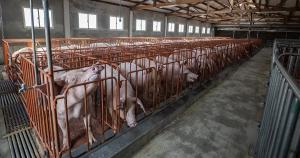Animal Groups File Brief Urging Court to Uphold Question 3, Reject Pork Industry's Bid to Erode Anti-Confinement Vote
Factory farming interests lost landmark case before U.S. Supreme Court, NPPC v. Ross, yet they continue to advance far-fetched legal claims
In 2016, voters in Massachusetts approved Question 3 to prohibit extreme confinement on Massachusetts farms and also to bar statewide sale of pork coming from mother sows raised in cruel, cramped confinement, no matter where the production occurs.
Last July, the Federal District Court in Massachusetts dismissed outright the industry’s many remaining legal challenges to the measure, finding no merit in them. The pork companies’ defeat followed a string of similar rebuttals from the court system dating back several years and culminating last year in the U.S. Supreme Court’s rejection of the industry’s attempts to short-circuit California’s Proposition 12, a similar law enacted by voters in that state.
“Massachusetts voters said no to extreme confinement in a landslide vote. And time and again the courts have upheld that law as a proper exercise of state authority,” said Wayne Pacelle, president of Animal Wellness Action and the Center for a Humane Economy, and a key architect of Question 3. “We expect the appellate court to fully reject the industry’s attempt to resurrect these already decided legal issues and end this protracted and unwarranted attack on democracy in Massachusetts.”
In this latest legal bout, the industry, represented by Triumph Foods and a handful of other plaintiffs, has appealed its case to First Circuit Court of Appeals, claiming that Massachusetts was preempted from enacting its sales prohibition by the Federal Meat Inspection Act while also attempting to relitigate the very same issues decided by the Supreme Court’s Proposition 12 decision, where not a single justice sided with the industry. Animal Wellness Action and the Center for A Humane Economy filed an amicus brief with the First Circuit asking the Court to reject industry’s flailing efforts to overturn the lower court’s findings.
Voters gave Question 3—which forbids gestation crates for sows, battery cages for hens, and small crates for veal calves—majorities in a stunning 348 of 351 towns in the Commonwealth and an extraordinary 78 percent supermajority statewide. The measure requires that breeding sows, laying hens, and veal calves have sufficient space to move and also that all pork, eggs, and veal sold in the state come from compliant farms, no matter where the animals are reared.
In May 2023, the Supreme Court of the United States upheld a nearly identical measure, California Proposition 12, as constitutional and a proper exercise of state authority. Prop 12 was modeled after Question 3, so the high court’s ruling in NPPC v. Ross left Question 3 intact as well.
The pork industry’s determination to circumvent these court rulings and the will of the people was further reflected in recent legislation introduced in Congress, where the EATS Act, S. 2019 and H.R. 4417 would not only gut Question 3 but also many other state agricultural laws and regulations. The bill would nullify any state or local law that places any kind of standard, regardless of its impact, on agricultural exchange, whether grounded on concerns about animal welfare, food safety, chemicals, agricultural pests, or worker safety.
“We trust that the First Circuit will make it clear to the industry that no slaughterhouse or processor—whether located in Massachusetts or not—is allowed to supply non-compliant pork to anyone in the Commonwealth,” Pacelle said. “It’s time for the industry to move on and to accept that it must stop abusing pigs in American pork production.”
Many major U.S. companies and restaurants, including McDonald’s and Costco, have already promised their consumers that they will forbid in relatively short order sourcing pork or eggs from operations that confine the sows or hens in extreme ways.
Wayne Pacelle
Animal Wellness Action
+1 443-865-3600
email us here
Visit us on social media:
Facebook
LinkedIn
Instagram
Legal Disclaimer:
EIN Presswire provides this news content "as is" without warranty of any kind. We do not accept any responsibility or liability for the accuracy, content, images, videos, licenses, completeness, legality, or reliability of the information contained in this article. If you have any complaints or copyright issues related to this article, kindly contact the author above.

